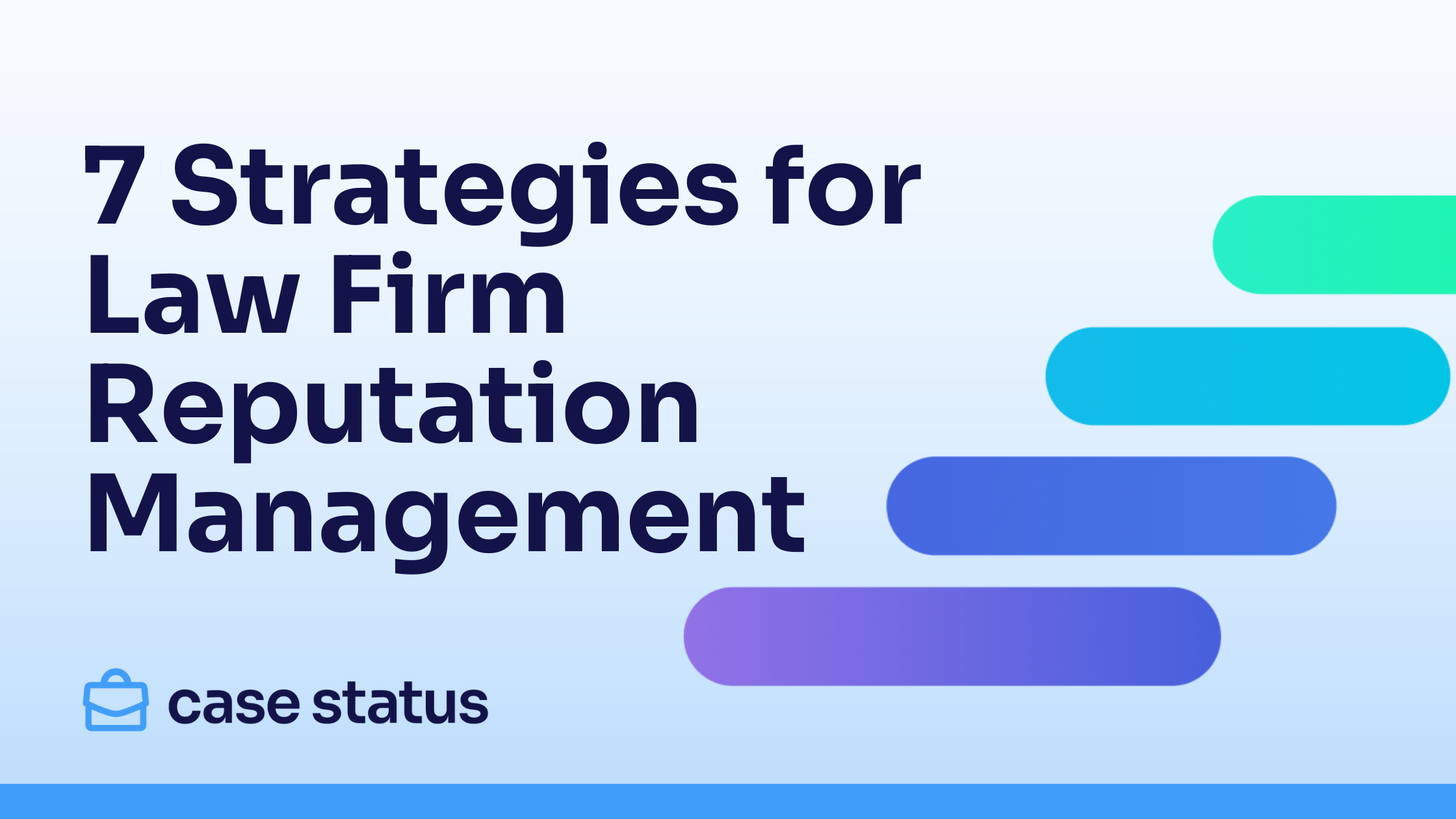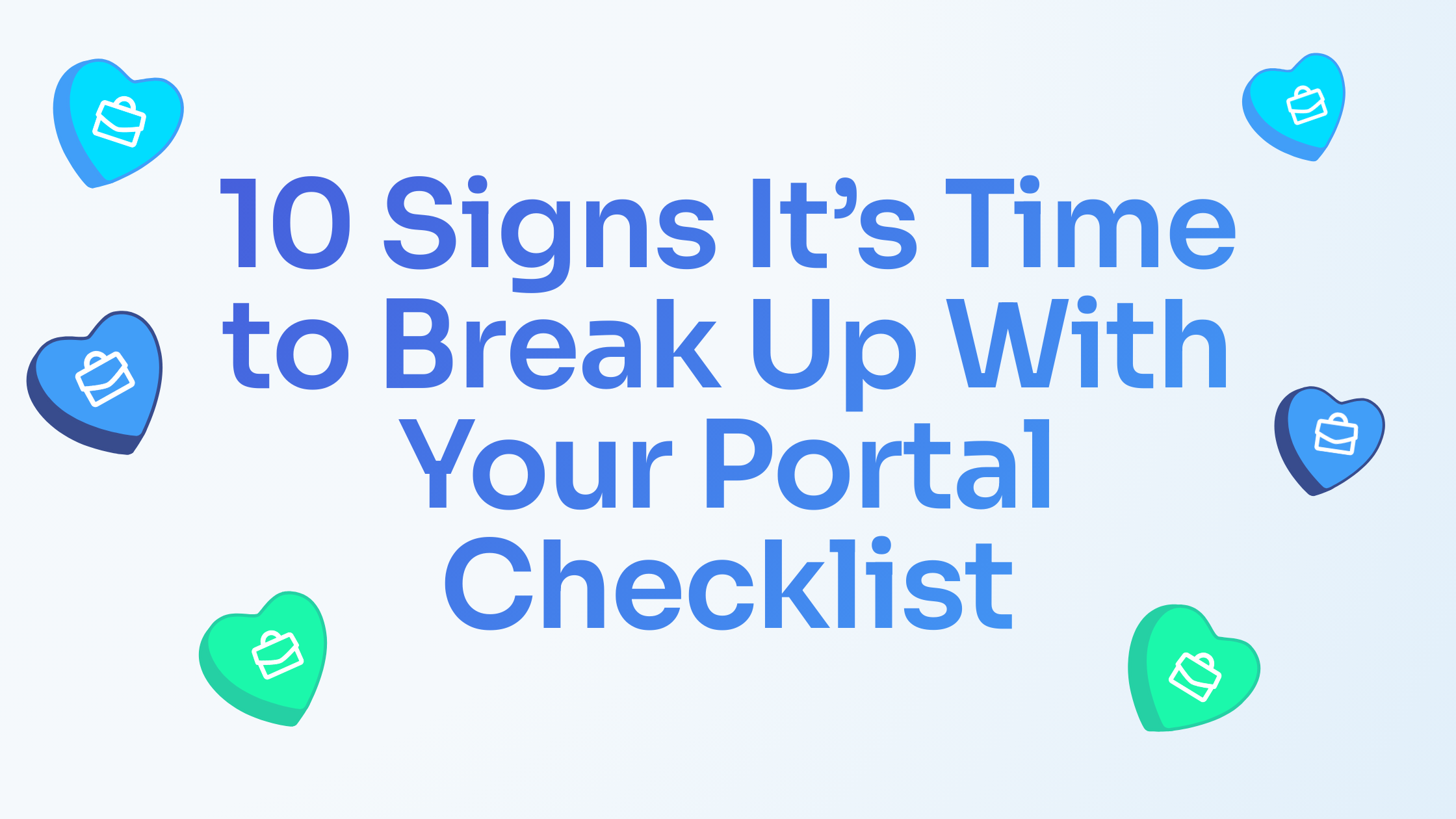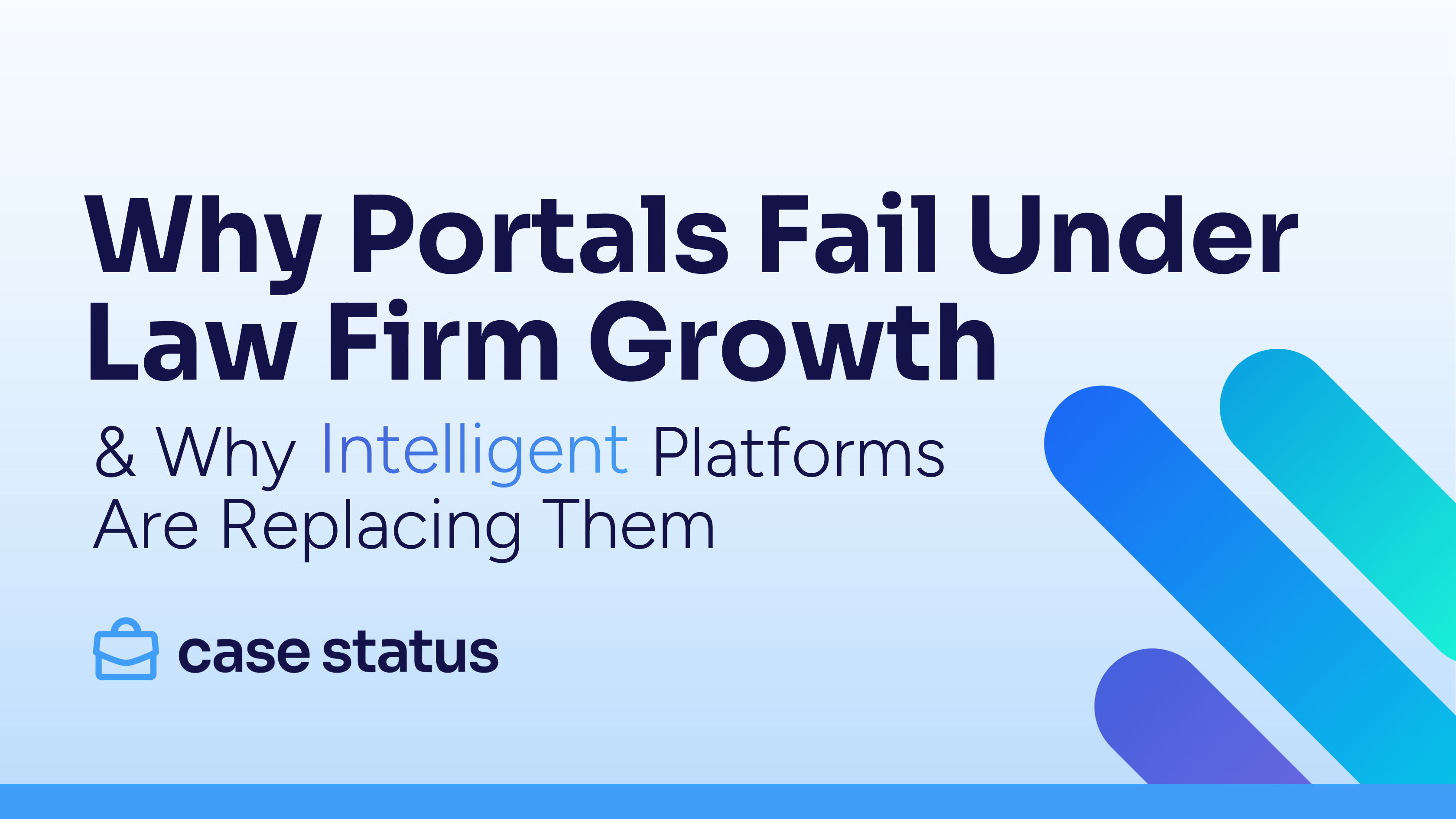
Everyone’s talking about AI and for good reason. But don't fear the AI. Recent advances in artificial intelligence (AI) have made it the most revolutionary technology since the internet. You’ve probably heard about ChatGPT by now, the AI chatbot by OpenAI that’s smart enough to earn an MBA (yes, really). Naturally, people have grown concerned over the implications of AI, especially when it comes to its ability to perform jobs that take a human several hours in a matter of seconds. Lawyers have expressed concern that AI will eventually negate the need for their services, but this isn’t the case. Instead, AI can support a lawyer’s work by accelerating productivity, reducing workloads, and even improving engagement with clients with recommended responses
In this post, we’ll explore the effect of AI in law firms and the benefits of artificial intelligence for lawyers and their clients.
What is legal AI, anyway?
Artificial intelligence uses machine learning to learn from data and improve its performance. The more data AI gathers, the more efficient it becomes. AI is already a part of our everyday lives: social media, personal assistants, customer service, navigation software, just to name a few.
Legal AI is artificial intelligence specifically designed to help make the legal process easier for professionals and clients; it can assist with tasks like documentation, bookkeeping, data analysis, research, and writing legal briefs.
This artificial intelligence has been optimized to assist lawyers in their administrative tasks while improving client access to legal education.
It’s no surprise that lawyers find themselves heavily stressed and bogged down by extensive paperwork and administrative tasks. In fact, 56% of lawyers that own a small firm (1-29 attorneys) report that they spend too much time on administrative tasks; 48% note a lack of internal efficiency. In contrast, in 2010, only 10% of lawyers reported that as a struggle.
Artificial Intelligence proposes solutions for all of these issues and more. Rather than overtaking the legal industry, AI is going to transform the way lawyers work—and how clients connect with them.
Is AI the end of law as we know it?
No, AI won’t replace lawyers. The internet made it easier for people to learn about the legal system and find reputable attorneys to represent them, but it didn’t negate the need for legal expertise.
While AI can effectively perform many administrative tasks far faster than any human lawyer, that doesn’t mean it is always accurate. It also cannot apply the nuanced perspective and critical thinking skills that only an experienced lawyer can provide to their clients.
The biggest concern lawyers have is that artificial intelligence will render their services useless. Some envision a future where clients simply share their issues with a computer, and in a matter of minutes, it will have all the necessary paperwork drawn up and ready to submit to a court.
That may sound like a scary possibility, but it’s extremely unlikely. The risk of computer error is still far too great to place people’s legal welfare in the hands of technology. Lawyers can leverage AI as a tool to make research and drafting documents easier; they can utilize it as a way to automate internal processes and improve efficiency in their firms.
There is also the ethical challenge that goes along with the idea of AI taking full control of any legal process. This will need to be further reviewed and discussed before we even consider such a leap.
But no AI can replace the talent, knowledge, and personal touch of a lawyer who cares about their clients and works hard for them every single day. The dedication of an attorney is unmatchable, no matter how much more efficient an AI may be at writing briefs and retrieving case information.
AI Will Change, Not Eliminate
Eric Talley, a professor at Columbia Law School, spoke with Fox News about the future of AI and law. Talley has led courses on machine learning and law and believes that AI will ultimately improve efficiency by supporting lawyers’ skill sets.
The ability to perform tasks more efficiently will save them time and money, broadening the scope of their workflows and allowing more time to actually serve their clients.
Talley noted that machine learning isn’t new to the legal field; Westlaw and Lexis both use the technology to retrieve documents from their huge databases. The real value of AI lies in expediting the traditional legal research processes that can take, at best, several hours and endure for several months to even over a year in complex cases.
For those who are concerned that ChatGPT will replace lawyers entirely, Talley offers some solace. He revealed that upon asking the AI to bring up a case supporting a particular claim, the bot provided a range of details, including the name of the judge that handled it and the names of the defendant and plaintiff.
The only problem is that this case doesn’t exist. Talley even went so far as to contact the judge ChatGPT named, who said they had no recollection of that trial ever occurring. Talley urges lawyers to be “really, really careful” when using AI tools as database alternatives, as they are not 100% accurate and, in some cases, can fabricate information entirely.
This is one example of how AI, while useful, is not a replacement for human legal counsel. Only a qualified attorney is capable of finding the most relevant information for a case, incorporating the most useful clauses into contracts, and drafting legal documents that are truly sound and will hold up in a court of law.
Chat GPT and AI will be an excellent tools that innovative lawyers will weld to help them but certainly not replace them.
Adopting an AI-minded approach to law will ultimately help lawyers, especially those who run their own firms, to become more responsive to clients’ needs in an increasingly competitive marketplace.
Lawyers who are struggling to attract consistent business, or those who need cost-effective solutions to sustain their growth, can equally benefit from using artificial intelligence. Whether it’s applied in legal marketing, research, or automation, AI is a tool that we should all leverage, not fear.
AI Will Make the Legal Industry Better, More Efficient
Law firms can utilize artificial intelligence in many ways to further their careers, reduce their workloads, and improve client satisfaction. Both small and large firms are always in a balancing act, trying to ensure they are dedicating enough time to each client while still managing their administrative tasks efficiently.
It’s no surprise burnout is high in the legal industry, and lawyers are some of the most stressed professionals on the planet. Artificial intelligence presents an exciting opportunity for lawyers to lighten their legal load without compromising the quality of their client care or services.
Legal work is filled with repetitive tasks that can easily be offhanded to appropriate technology. Rather than lose working opportunity, lawyers will instead be able to spend more time lending their expertise where it can have the greatest impact.
For example, good legal AI software will help lawyers draft contracts or messages more efficiently—but it won’t eliminate the need for them to fill in all the details and provide valuable insight. Using AI to facilitate the drafting process ultimately means faster turnarounds and happier clients.
Being able to perform more efficiently can also reduce client demand, meaning there is less pressure placed on lawyers and a lower margin of error. Most legal mistakes stem from high stress and work that spans far beyond billable hours.
Document review is another potential application of AI in law, but its still in its infancy. Language models are far from error-proof, and trusting one to perform complicated, high-stakes legal analyses could ultimately jeopardize the outcome of a case.
However, trained lawyers could use AI to compile information in more manageable data sets, sort them by a defined set of parameters, and apply their own skills and knowledge to infer conclusions more efficiently.
The same applications can be done to aid paralegals in their work, too. By training the entire legal team to use AI wisely in the workplace, firms can perform faster while lowering costs and boosting productivity.
We know that AI isn’t a quick-fix to any problem, and that’s exactly why it won’t replace real lawyers. Although it may help clients advocate for themselves better, it cannot and will not be able to replace a lawyer’s insight and talent.
The responsibility for great legal outcomes will always rest squarely on humans’ shoulders, but the burden of administrative tasks and legal processing may be lightened with the right technology.
Legal AI Impact on Client Satisfaction
When it comes to keeping clients happy, lawyers have to perform their jobs quickly while managing multiple cases at a time. Continuous demand can lead to greater stress and even delay progress, since attorneys don’t get paid for constantly replying to emails, texts, or phone calls.
AI may help clients feel more empowered throughout the legal process by offering greater information and assistance throughout their case.
By making documentation and communications faster and easier for lawyers, AI can ultimately make clients happier. The most tedious tasks can be given to the software, which is able to condense hours of work into mere minutes, and deliver rapid results that are not only insightful but tailored to each client’s individual needs.
Lawyers can, in turn, spend more time delivering high-value customer service rather than sifting through hundreds of pages and struggling to maintain focus as the day drags on.
The American Bar Association reports that legal AI can help lawyers perform more creative analyses, engage with their clients more, and perform work that is more rewarding. The ability to deliver faster, more effective legal services also helps lawyers on the business front; the happier clients are, the more likely they are to recommend your services to someone else.
Any lawyer working in their own firm knows how difficult marketing can be, especially when you try to pencil it in on top of all your other far more pressing tasks. Outsourcing your legal marketing is an option, but it can still be a challenge to review web and social content, meet with your advertising team, and fully shape your marketing strategy to capture your firm’s values perfectly.
With AI, it’s easier for you to draft potential blog post ideas, social media content calendars, and even emails. You can use AI to draw inspiration, refine your own ideas, and communicate more effectively with marketers.
If you’re running your own legal marketing, then AI can be even more valuable. By creating handy blog post templates, it can allow you to plug in the details clients want to know, showcase your expertise online, and build credibility that ultimately leads to more requests for consultations.
The Future Is Bright With AI
Lawyers need not fear that their firms will go under as clients turn to their laptops for the best counsel around. Real lawyers are irreplaceable, no matter how sophisticated AI becomes. Instead of fearing what they may do, think about all the redundant tasks they can automate for you, so you can perform your job even better.
With the help of legal AI software, lawyers can free up time and money lost to administrative work and fully pursue their legal passions. At Case Status, we have already implemented a few forms of AI to drive scale and client delight. For example, with Real-Time Translation we have harnessed Google’s Neural Machine Translation (NMT) to offer translation suggestions for written communications in 138 different languages, allowing firms to serve more clients: those who do not speak English very well and those who prefer a language other than English. This helps firms to serve more in their community, drive better engagement, and do all of this at a lower cost point. This is the value of AI and only the beginning of how we plan to help firms scale in the effort of better client engagement.
Trusted software providers will find effective ways to embrace AI and help lawyers in ways that are efficient and ethical. This will make lawyers’ jobs easier and clients’ experiences and results better. Others may not, if you’re still questioning whether AI can replace lawyers, just check out this article about the AI robot that tried to argue in court. Its founder is now being sued for practicing law without a license.
And most of all, remember "Don't fear the AI"
To stay up to date in the latest AI news at Case Status and throughout the legal industry, and how you can expect it to impact your law practice, subscribe to our blog.



